American Jewish Archives Journal, Volume 64, Numbers 1 & 2
American Jewish Archives Journal, Volume 64, Numbers 1 & 2
American Jewish Archives Journal, Volume 64, Numbers 1 & 2
Create successful ePaper yourself
Turn your PDF publications into a flip-book with our unique Google optimized e-Paper software.
Greg Robinson, a native New Yorker, is professor of history at l’Université du Québec à<br />
Montréal, a French-language institution in Montreal, Canada. A specialist in North<br />
<strong>American</strong> ethnic studies and U.S. political history, he is the author of A Tragedy of<br />
Democracy: Japanese Confinement in North America, By Order of the President:<br />
FDR and the Internment of Japanese <strong>American</strong>s and After Camp: Portraits in<br />
Midcentury Japanese <strong>American</strong> Life and Politics. Among his edited works are the<br />
anthology Miné Okubo: Following Her Own Road and the volume Pacific Citizens.<br />
His historical column, “The Great Unknown and the Unknown Great,” is a well-known<br />
feature of the Japanese <strong>American</strong> newspaper Nichi Bei Weekly.<br />
Jonathan B. Krasner, The Benderly Boys and <strong>American</strong> <strong>Jewish</strong><br />
Education (Waltham, MA: Brandeis University Press, 2011), 498 pp.<br />
Jonathan Krasner’s excellent book tells the story of Samson Benderly and<br />
his disciples—primarily Alexander Dushkin, Isaac Berkson, Israel Chipkin, Leo<br />
Honor, and Emanuel Gamoran—and the effect that they had on <strong>American</strong><br />
<strong>Jewish</strong> education in the first half of the twentieth century. <strong>Jewish</strong> education was<br />
truly in dismal shape one hundred years ago. Only small numbers of children<br />
were being educated; teachers were mostly eastern European immigrants using<br />
old-school methods that did not reach the new generation; the physical plant<br />
of schools was grossly inadequate; and there was little communication among<br />
schools. Inspired by the progressive educational vision of John Dewey and the<br />
organizational culture of public schools, Benderly and his “boys” set out to<br />
change all of this through the efforts of the bureaus of <strong>Jewish</strong> education that<br />
they founded and led. In relatively short time they transformed the landscape<br />
of <strong>American</strong> <strong>Jewish</strong> education. They trained a generation of <strong>American</strong>-born<br />
teachers and raised their salaries, increased the number of girls receiving a <strong>Jewish</strong><br />
education, created the first professional journals for the field, incorporated<br />
methods of informal education in schools, lowered class sizes, gave children<br />
proper time to play in purposefully crafted physical spaces, introduced the<br />
learning technologies of the day (slides, maps, charts), created the first <strong>Jewish</strong><br />
educational summer camps, cultivated youth movements, published children’s<br />
magazines, and helped foster the development of <strong>Jewish</strong> children’s music.<br />
Equally significantly, they convinced <strong>Jewish</strong> leaders that <strong>Jewish</strong> education was<br />
a communal challenge, one worthy of receiving a respectable percentage of the<br />
community’s limited financial resources.<br />
Benderly and his disciples embraced the <strong>Jewish</strong> ideological vision of Ahad<br />
Ha’am, and this informed their work in multiple ways. They emphasized<br />
<strong>Jewish</strong> peoplehood and viewed <strong>Jewish</strong> texts, holidays, and the arts as expressions<br />
of <strong>Jewish</strong> national culture rather than as religious artifacts. They had<br />
little personal interest in religion and saw it largely as a divisive force in <strong>Jewish</strong><br />
life. This rendered many of them ill prepared to respond to the rise of <strong>Jewish</strong><br />
denominationalism, a weakness recognized early on by Mordecai Kaplan,<br />
the other important influence on their <strong>Jewish</strong> ideology. The Benderly circle<br />
1<strong>64</strong> • <strong>American</strong> <strong>Jewish</strong> <strong>Archives</strong> <strong>Journal</strong>
















